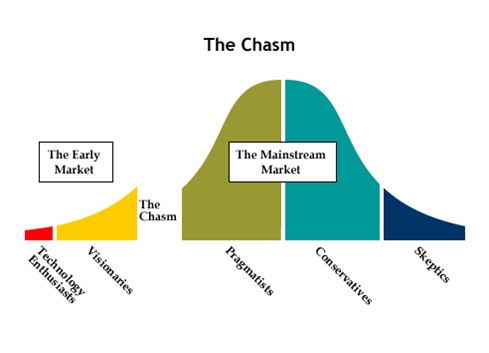I feel like I read this book without breathing. Some things just come along at the right time.
Geoffrey Moore’s iconic book, Crossing the Chasm, focuses exclusively on marketing strategies in the high-tech start up world, but I couldn’t help but to see numerous parallels. I’m the founder of a [still-newly-born] experiential education company called the Odyssey Institute, which in many respects couldn’t be more different. But our need to develop an effective marketing strategy is as real and essential as it is any high-tech start up. Here’s what I’ve learned from this book so far…
The Chasm
The chasm is the fathomless void that exists between where you start and where you need to end up if you want your company to become sustainably profitable. Don’t get me wrong, its actually possible to still be in business in year 10 without crossing the chasm – you just won’t be enjoying it much!
A chasm crossing is a profound experience for a company as it involves an evolutionary leap in corporate identity, with all that is implied for your company’s products/services, systems and people.
The Early Market
One thing you can guarantee about a new product is that its far from perfect, but somehow these things still get sold. So who would buy a far-from-perfect product? Well, we probably all have at some point, but generally the answer is enthusiasts and visionaries – or what Geoffrey Moore refers to as “techies”.
We have a handful of enthusiastic and visionary clients that make up our current early market share. We wouldn’t exist without them. In our case these folks are not techies in the IT sense, rather our techies are passionate educators who are looking for innovative educational products and solutions to the issues their students (and schools) are facing. Our techies are even willing to help create those solutions; they’re willing to get involved, buy a far-from-perfect product and go out on a professional limb. That’s an exact parallel to Silicon Valley.
Some of our techies are our friends and colleagues from previous jobs; they are our network of kindred spirits and share our passion for experiential education, holism and – most importantly CHANGE. Working with them has allowed us to develop an initial product and get it into the market place. We’ve successfully done that and thus officially launched!
Our initial service was a series of field trips in Bali, Indonesia. I designed educational experiences to be facilitated in very unconventional classrooms (i.e. amidst rainforests and ancient temples) and used my network to both refine and sell these services. Although continually growing, my network is relatively small and the amount of sales we’re acquiring and retaining is far from the vision of greatness and profitability that I set out with. Suffice to say, we’re still entrenched in the early market sector, where we’re dependent on our slowly growing cohort of enthusiasts and visionaries.
The early market sector isn’t necessarily a bad place for us to be right now and we’re not in a hurry to leave it behind (despite the roller coaster of financial insecurity on this side of the chasm). We’re just starting our third year of operations and are still very focused on market research and product development. I guess that never stops, but you’d better be pretty sure you’ve got a solid foundation before you attempt a crossing. I don’t think Odyssey is quite there yet.
Beyond the Early Market
As we solidify our position in the early market our trajectory across the chasm is slowly revealing itself. Over the last two years we’ve been tip-toeing up to the edge of the chasm and staring across at the other side. Our early successes and loyal techies have lead us to the edge and we’re now beginning to engage with the pragmatists and conservatives of the mainstream market beyond. These pragmatists and conservatives are the faculty and administrative staff of the most established educational institutions in South East Asia. By definition they have a low tolerance for risk and a general disdain for anything “cutting edge” (despite often appearing to champion such values). The want “whole products” that have been tried and tested. They’re willing to pay more for them, but they’re also willing to wait almost indefinitely (or even just take their business elsewhere) if the service provider isn’t quite up to par. Needless to say this is a far less personal and substantially more bureaucratic kind of relationship.
Geoffrey Moore encourages start ups to cross the chasm by finding a “beach head”. Its a 2nd World War D-Day analogy, but it works. You cross the chasm by penetrating a niche-market with your [by-now-hopefully-pretty-well-developed] product/service. You identify a specific point of entry (beach head) and aggressively go after that market segment with everything you’ve got. Once you go for it, its do or die time!
Choose your weapon
A key decision to make before a chasm crossing is which product/service to really get behind. We have a small, increasingly focused range of services that we’re offering and aren’t quite ready to choose. Our middle school field trips are doing really well, but our Odyssey Film School is also looking really promising. So for now we’ll keep looking to build our early market position and further establish our programs and reputation. I figure when the time is right we’ll know and at some point in the next 6-12 months we’ll have the clarity and momentum we need to leap across.





